
Ralph Waldo Rose was an American track and field athlete. He was born in Healdsburg, California.

The men's 110 metres hurdles was the shorter of two hurdling events at the 1908 Summer Olympics in London. It was dominated by the American runners. The competition was held from Thursday, July 23, 1908, to Saturday, July 25, 1908. 25 hurdlers from ten nations competed. NOCs could enter up to 12 athletes. The event was won by Forrest Smithson of the United States, the fourth of five consecutive victories for the nation in the first five Olympic Games. It was also the third of four consecutive podium sweeps for the Americans in the event.

John Carlyle Garrels was an American athlete who excelled in the 110 metres hurdles, discus throw, shot put, and as a fullback and end in American football.
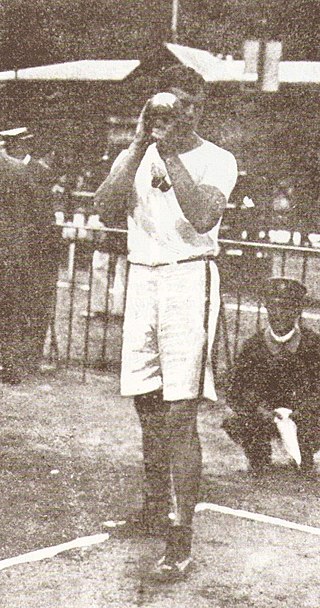
The men's shot put was a track & field athletics event at the 1900 Summer Olympics in Paris. It was held on July 14 and July 15, 1900. 11 shot putters from five nations competed. The event was won by Richard Sheldon of the United States, the nation's second consecutive victory in the men's shot put. Josiah McCracken took silver and Robert Garrett took bronze, completing an American medal sweep.

The men's discus throw was one of six throwing events on the Athletics at the 1908 Summer Olympics programme in London. The competition was held on 16 July 1908. 42 throwers from eleven nations competed. NOCs could enter up to 12 athletes. The event was won by Martin Sheridan of the United States, his second consecutive victory in the event. The Americans completed their first sweep in the discus throw, with Merritt Giffin taking silver and Bill Horr bronze.

Wesley William Coe Jr., sometimes listed as William Wesley Coe Jr., was an American track and field athlete who competed principally in the shot put and also in the hammer throw, discus throw, and tug of war.
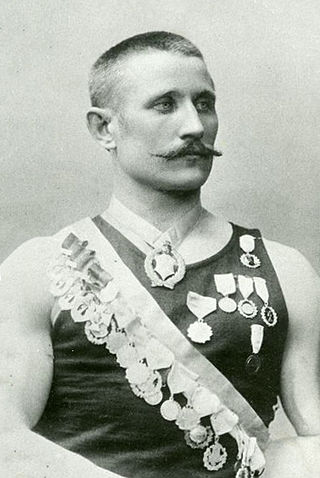
Venne "Verner" Järvinen was a Finnish track and field athlete, who competed mostly in throwing events. He won the gold medal in the Greek-style discus in the 1906 Intercalated Games, and the bronze in the 1908 Summer Olympics, becoming the first Finnish Olympic medalist in athletics. He won the Finnish championship in Greek style discus three times in 1909–1911 and held the national record in discus and hammer throw.

The men's shot put was a track and field athletics event held as part of the Athletics at the 1904 Summer Olympics programme. It was the third time the event was held. The competition was held on August 31, 1904. 8 athletes from 2 nations competed. The event was won by Ralph Rose of the United States, the nation's third consecutive victory in the men's shot put. Americans won silver and bronze as well, completing the second consecutive podium sweep in the event.
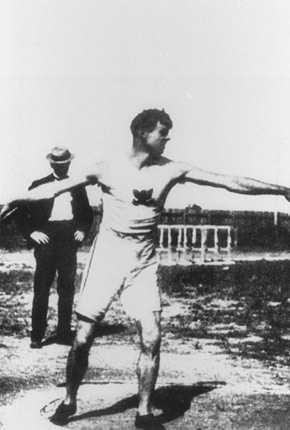
The men's discus throw was a track and field athletics event held as part of the Athletics at the 1904 Summer Olympics programme. It was the third time the event was held. The competition was held on Saturday, September 3, 1904. Six athletes from two nations competed.

The men's shot put was a track and field athletics event held as part of the athletics at the 1912 Summer Olympics programme. The competition was held on Wednesday, July 10, 1912. Twenty-two shot putters from 14 nations competed. NOCs could enter up to 12 athletes. The event was won by Pat McDonald of the United States, the nation's fifth consecutive victory in the men's shot put. The American team swept the top three places, the third time in five Games. Ralph Rose took silver, 9 centimetres shy of a third gold medal; he became the first man to win three medals of any color.

The men's shot put was an event at the 1956 Summer Olympics in Melbourne, Australia. The event was also known at the time as putting the weight. The qualifying round and the final both were held on Wednesday November 28, 1956. Fourteen shot putters from ten nations competed. The maximum number of athletes per nation had been set at 3 since the 1930 Olympic Congress.
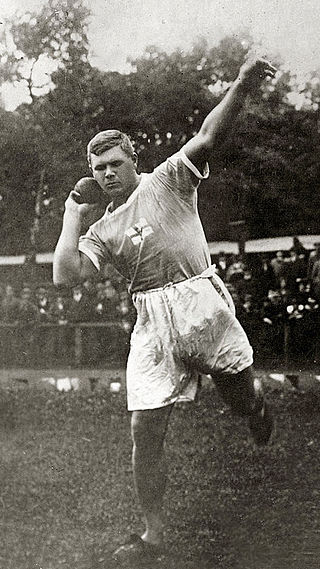
The men's shot put event was part of the track and field athletics programme at the 1920 Summer Olympics. The competition was held on Tuesday, August 17, 1920, and on Wednesday, August 18, 1920. Twenty shot putters from ten nations competed. No nation had more than 4 athletes, suggesting the limit had been reduced from the 12 maximum in force in 1908 and 1912. The event was won by Ville Pörhölä of Finland, the first time the men's shot put was won by someone not from the United States. Fellow Finn Elmer Niklander took silver. The Americans, who had won all five previous editions of the shot put, including three medal sweeps, settled for bronze by Harry B. Liversedge.

The men's shot put event was part of the track and field athletics programme at the 1924 Summer Olympics. The competition was held on Tuesday, July 8, 1924. 28 shot putters from 15 nations competed. The maximum number of athletes per nation was 4. The event was won by Bud Houser of the United States, the nation's sixth victory in the men's shot put. Glenn Hartranft took silver and Ralph Hills took bronze to complete the Americans' fourth medal sweep in the event.
The men's shot put event at the 1980 Summer Olympics in Moscow, Soviet Union had an entry list of 16 competitors from 11 nations. The maximum number of athletes per nation had been set at 3 since the 1930 Olympic Congress. The final was held on Wednesday 30 July 1980, with the qualifying round staged two days earlier in the Lenin Stadium. The top twelve and ties, and all those reaching 19.60 metres advanced to the final. The event was won by Vladimir Kiselyov of the Soviet Union, the nation's first victory in the men's shot put. The Soviet Union became only the third nation to reach the podium in consecutive Games in the event, as East Germany became the second to reach a three-Games streak on the podium as Udo Beyer took bronze. Beyer and Aleksandr Baryshnikov became the ninth and tenth men to win multiple medals in the shot put.
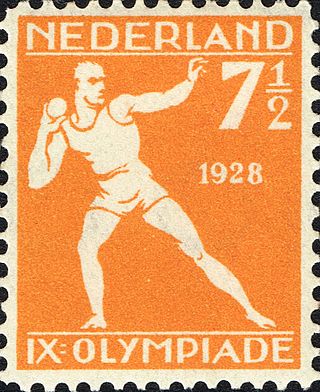
The men's shot put event was part of the track and field athletics programme at the 1928 Summer Olympics. The competition was held on Sunday, 29 July 1928. Twenty-two shot putters from 14 nations competed. The maximum number of athletes per nation was 4. The event was won by Johnny Kuck of the United States, the nation's second consecutive, and seventh overall, victory in the men's shot put. Kuck set a new world record. Future film star Bruce Bennett, then still using his birth name Herman Brix, took silver. Emil Hirschfeld won Germany's first shot put medal with bronze.

The men's shot put throwing event at the 1960 Olympic Games took place on August 31. Twenty-four athletes from 16 nations competed. The maximum number of athletes per nation had been set at 3 since the 1930 Olympic Congress. The event was won by Bill Nieder of the United States, the nation's fourth consecutive and 12th overall victory in the men's shot put. Parry O'Brien and Dallas Long took silver and bronze, giving the American team its sixth medal sweep in the event. O'Brien, who had won gold in 1952 and 1956, matched Ralph Rose in coming just shy of a third gold medal. The two remain, through the 2016 Games, the only men to win three shot put medals. Nieder was the fifth man to win two medals.

The men's shot put competition at the 1968 Summer Olympics in Mexico City, Mexico took place on October 13–14. Nineteen athletes from 14 nations competed. The maximum number of athletes per nation had been set at 3 since the 1930 Olympic Congress. The event was wo by Randy Matson of the United States, the nation's sixth consecutive and 14th overall victory in the men's shot put. His teammate George Woods took silver, making 1968 the sixth straight Games the Americans had finished one-two. Matson was the seventh man to win two medals in the event ; Woods would become the eighth in 1972. Eduard Gushchin took bronze, the Soviet Union's first men's shot put medal.
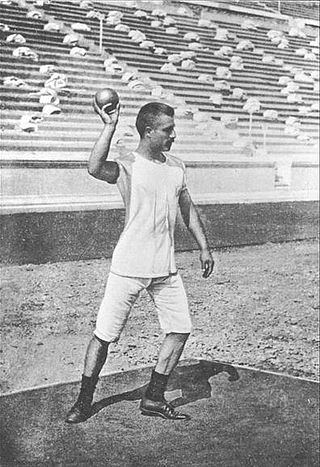
The shot put at the Summer Olympics is one of four track and field throwing events held at the multi-sport event. The men's shot put has been present on the Olympic athletics programme since 1896. The women's event was added to the programme at the 1948 Olympics just over fifty years later.

The discus throw is one of four track and field throwing events held at the Summer Olympics. The men's discus throw has been present on the Olympic athletics programme since 1896. The women's event was first contested at the 1928 Olympics, being one of the five athletics events in the inaugural Olympic women's programme.

The hammer throw at the Summer Olympics is one of four track and field throwing events held at the multi-sport event. The men's hammer throw has been present on the Olympic athletics programme since 1900, becoming the third Olympic throws event after the shot put and discus throw. The women's event was a much later addition, being first contested at the 2000 Olympics.



















